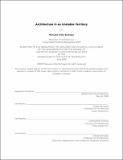Architecture in an unstable territory
Author(s)
Uribe Buitrago, Manuela.
Download1055764473-MIT.pdf (27.85Mb)
Other Contributors
Massachusetts Institute of Technology. Department of Architecture.
Advisor
Lorena Bello Gómez.
Terms of use
Metadata
Show full item recordAbstract
This thesis argues that traditional architectural practice is insufficient to respond to the instabilities of rapid informal urbanization in Latin America. Traditional practice has mostly focused on designing objects, but informal territories instead need architects able to embrace complex social agendas, environmental risks, the lack of infrastructure and constant migration. Under these circumstances, this thesis proposes four new design protocols that constitute a new design process: 1. architects start by building trust and empathy with the community, 2. architects' responsibility extends beyond designing objects to designing systems, 3. architects rethink the use of materials and get involved in their projects' production process and 4. architects acknowledge that design is by necessity incomplete. These protocols result from my experience working in an informal settlement surrounded by swampland in Cartagena, Colombia, where I worked hand in hand with the community and a local foundation. From a deep understanding of the place, I envisioned an informal water-based mobility system. The system considers alternative material sources such as plastic waste and explores 3D printing's potential to facilitate local production. The system joins actors who will economically support the project and identifies programs that enhance people's livelihoods while promoting the swamp's ecological restoration. Acknowledging that design is incomplete, the work presents possible "design hacks" or reinterpretations that result from the informal settlers' agency. Ultimately, these design hacks can become catalysts for design upgrading and innovation. These new architectural protocols present a paradox. They expand architects' agency by requiring them to assume additional responsibilities. At the same time, these protocols require architects to relinquish some of their traditional responsibility for full control over the design. Even if paradoxical, this new approach can motivate future forms of architectural pedagogy and practice that envision new tools and adjust methods and agency consistent with informal urbanization.
Description
This electronic version was submitted by the student author. The certified thesis is available in the Institute Archives and Special Collections. Thesis: S.M., Massachusetts Institute of Technology, Department of Architecture, 2018 Cataloged from PDF version of thesis. Includes bibliographical references (pages [66]-[67]).
Date issued
2018Department
Massachusetts Institute of Technology. Department of ArchitecturePublisher
Massachusetts Institute of Technology
Keywords
Architecture.